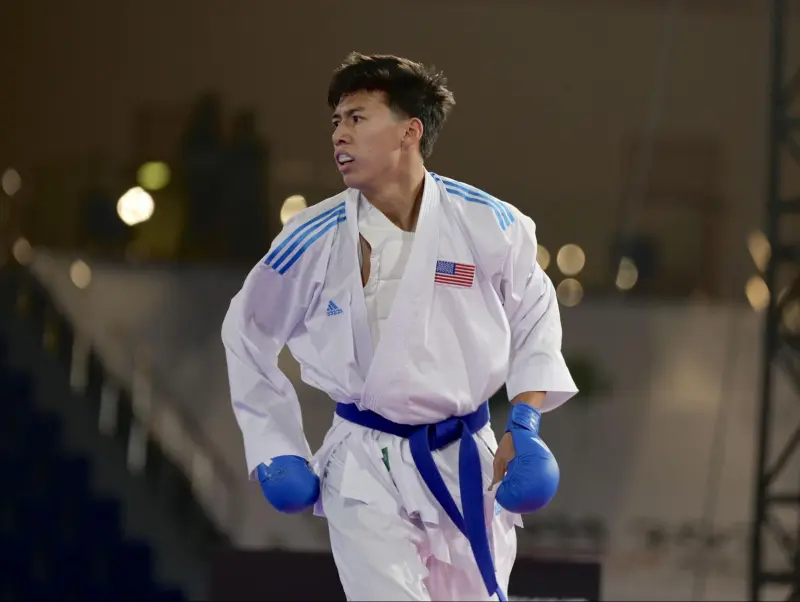Last week — for the first time in 10 years — the prestigious World Combat Games took place in Riyadh, Saudi Arabia. This tournament features the top eight fighters globally, across each weight category, for different combative Olympic sports. One of the eight elite fighters in the karate category was Stanford’s very own Mateo Solis ’27, representing Team USA.
Freshman to fighter
A freshman at Stanford this year, Solis was barely a month into college before he flew across the globe to enter the combat sport powerhouse of the world. “It was tough to prepare,” Solis said of his training at Stanford in the weeks leading up to the competition. Since karate is not an NCAA sport, Solis trained independently from the school.
“It’s taken a lot of creativity [to train],” Solis said. “For example, at [the Arrillaga gym] there are martial arts mats. I had to find that on my own.”
Solis was determined to keep his conditioning up, and found support at Stanford in his new friendships. “I would have my friend Nathan [Min] help hold the pads for me,” Solis said. “He was more than willing to help.”
Min can attest to Solis’s abilities on the mat: “Mateo is truly an athlete that leaves everything on the mat whenever he trains. Every time we finish an exercise he always decides at the end to add more time to push himself even more which is truly respectable.”
Solis performed on the world stage of karate last week with the American flag on his chest. When asked about what it’s like to reach this nearly unattainable level, Solis said that “the number one thing that keeps me grounded is gratitude.” Solis’s story is one of hard-work, determination and the courage to redefine what it means to be a “Karate Kid.”
‘Karate Kid’ to karate kid
“I was four years old, and I watched ‘The Karate Kid’ for the first time,” Solis said. Inspired by the movie, he begged his parents to enroll him in a karate class: “They did, for my birthday, and I never looked back.”
Solis is from Evanston, Illinois, and the first club that he enrolled in is one of the best in the country — Fonseca Martial Arts Dojo. The dojo was founded by John Fonseca, the first karate athlete in the world to win back-to-back gold medals at the Pan-American Games, the first American to medal at the Karate World Championships in over a decade and Solis’s coach.
“It has been a real pleasure and honor watching Mateo go from a four-year-old karate kid to competing against, and often beating, the best in the world as an adult now,” said Fonseca. Karate is a very individual sport, and Solis’s journey to the elite levels involved a lot of mental discipline.
“Once you step out onto the mat … it’s all up to you and your own performance,” Solis said. “The wins feel so good and the losses are just absolutely crushing.”
Fonseca worked with Solis on using the losses as stepping stones to success.
“I … remind [Solis] to cherish the experience, to keep things in perspective, to learn from the losses but to let them go quickly, and to not care too much what other people think,” Fonseca said. “I emphasize to play for the love of the game and for nobody else, and that ‘failure equals feedback.'” Fonseca said he advised Solis to focus on outworking everyone and that accolades would follow naturally.
And they did. One month before Solis came to Stanford, he was crowned the back-to-back karate champion at the Pan-American games in Santiago, Chile. “I trained as hard as I could,” Solis said. “I knew that if I competed at my best that I could take the gold. It was so enjoyable. I just got back to what I originally started karate for.”
Artist to athlete
Solis started karate to become an athlete.
“I find karate to be an impressive sport because it requires incredible athleticism, speed, explosiveness, agility, reaction timing, all while maintaining proper control to keep yourself and your opponent safe,” Fonseca said. “But most importantly, the karate athlete must control their emotions and demonstrate respect to their opponent and the officials no matter what occurs.”
While this seems obvious to Solis and Fonseca, who grew up in the intense world of competitive karate, not everyone thinks of karate in this way.
“[A stereotype] that really stuck with me is one of my teacher’s in seventh grade,” said Solis. “I told her that I was going to a big tournament and that I had to miss a lot of school, and she basically disregarded my status as an athlete and called me ‘an artist.’”
Solis doesn’t think of himself as an artist. “I’m just as much of an athlete as people on the football team or on the basketball team … It’s just not well-known enough.”
But Solis is changing that. In January 2021, Solis founded Tatami USA, a karate news company with a similar format to ESPN sports media feeds, focused on shedding light on karate as a sport. “I realized that people on the outside world don’t have too much of an understanding of what karate is about,” Solis said. “I have this vision of karate being seen as what it should be: a competitive Olympic-level sport.”
Solis is certainly a testament to the message he’s focused on promoting. As Fonseca said, “Solis is an exceptional athlete whose work ethic, grit and determination have enabled him to rise to each challenge.”
